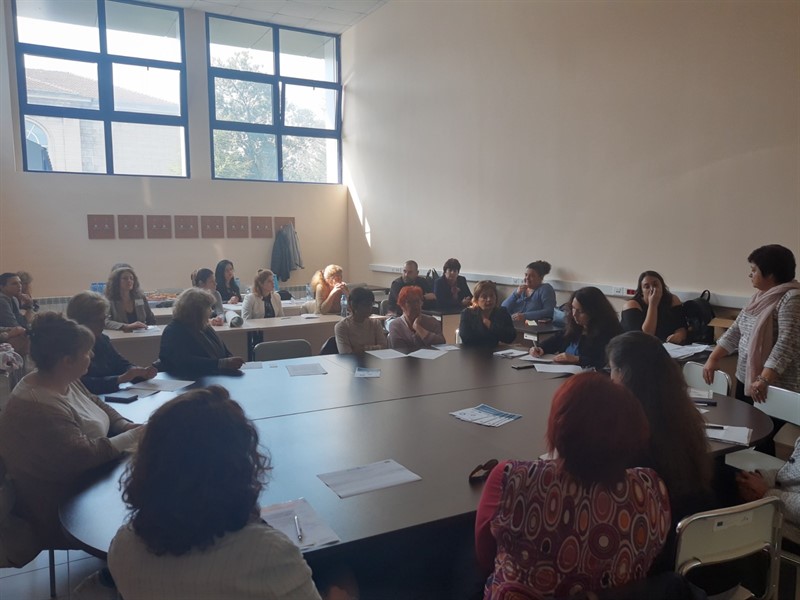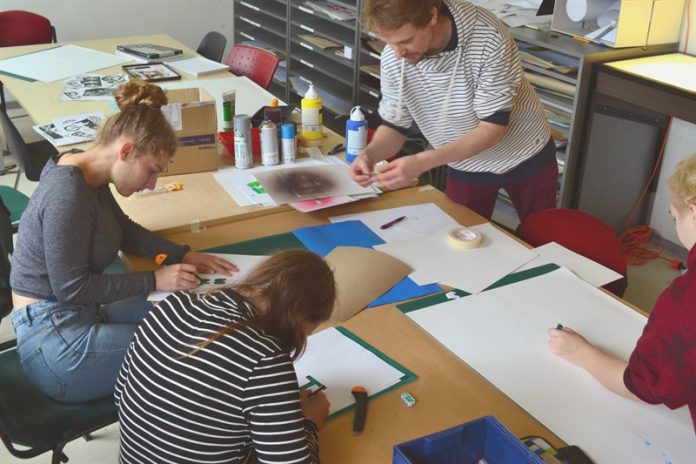As part of European Vocational Skills Week 2019, organisations from around the EU are hosting events and activities, emphasising the benefits of vocational education and training. Project partners of CODE project have taken the opportunity to present the project among relevant stakeholders.
On 17 October 2019, the Human Resources Development Agency, the Lead partner of CODE project, took part in a forum-exposition “Vocational skills, internships and continuing education”, which was held in Ruse University ‘Angel Kanchev”. It was organized by Ruse Chamber of Commerce and Industry and Ruse University and was attended by local businesses, vocational high schools, continuing vocational training centers, citizens and other stakeholders.
The statistic shows that Bulgaria is third place in Europe on the NEETs unemployment, the participants shared their experience with young people. The working group discussed suggestions for improving NEETs awarenessof the possibilities for continuing education or involving them in the workforce, as well as on encouraging the role and the contribution of the non-governmental sector to the NEETs activation policies.The lecturers presented results from surveys, synthesized in six main recommendations, some of which listed below:
- Development of the opportunities and simplicity in the procedures for accessibility and speed validation of the knowledge and abilities, achieved in informal way.
- Encouraging the self-employment through creating and developing social enterprises NEETs2 NEETs type.
- Introducing of an obligatory pre-phase access to social services and support for evaluation of working skills and potential for professional realization (examples with good practices: JobSpeed Date- Italy, CH-Q- Netherlands)

All efforts focused on joint action plan for promoting employment through social enterprises, technology opportunities and implementation of new alternatives for qualification improvement. Similar workshops are still to take place in 5 different cities in Bulgaria, and all discussions and suggestions will be listed as a base to work on in future.
Representatives of the NGO sector and other institutions presented the benefits and outputs of projects striving to increase the NEETs possibilities for work and training.
HRDA presented project CODE, which benefits from a 2 300 000 €grant from Iceland, Liechtenstein and Norway through the EEA and Norway Grants and its objective is to provide opportunities for a quality employment to vulnerable young people at risk of poverty and to develop and implement a training programme for specialized digital competences such as digital design, graphics, 3D animation, and game design. Project’s main result will be a developed and a piloted training programme to boost target groups’ access to acquiring specialized competences for employability and self-esteem, as well as providing a new perspective to learning interactions and problem-solving, and thus, contributing to increasing the NEETs possibilities.
At the same time in Estonia, 17 October 2019, during the Skills Night, different vocational schools all over Estonia have invited people to take part in lectures and workshops of all kind. Tartu Art School, another project partner in CODE project, participated in that event, with a stencil workshop.
Stencils are frequently used by official organizations, including the military, utility companies, and governments, to quickly and clearly label objects, vehicles, and locations. Stencils for an official application can be customized, or purchased as individual letters, numbers, and symbols. This allows the user to arrange words, phrases and other labels from one set of templates, unique to the item being labeled. When objects are labeled using a single template alphabet, it makes it easier to identify their affiliation or source. Photoshop tutorial in the link: https://sites.google.com/view/stencil-lesson/photoshop-tutorial
Stencil workshop was available for everybody regardless of their previous experience. The workshop gave an overview of the stencil technique and what tools can be used. Participants themselves prepared stencils on their own, as well.
Stencil technique will be taught in Tartu Art School during the new digital design course, which starts in January 2020 as an outcome of project CODE activities. The workshop gave a good glimpse of what will the participants learn when the course commences.


